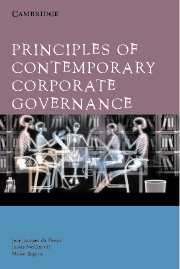Book contents
- Frontmatter
- Contents
- Table of cases
- Table of statutes
- Preface
- PART ONE CORPORATE GOVERNANCE: AN OVERVIEW
- PART TWO CORPORATE GOVERNANCE IN AUSTRALIA
- 5 Corporate governance in Australia – background and business initiatives
- 6 Regulation of corporate governance
- 7 The role of the regulators: ASX and ASIC
- 8 CLERP 9 reforms to the Corporations Act
- PART THREE CORPORATE GOVERNANCE IN PRACTICE
- PART FOUR CORPORATE GOVERNANCE: AN INTERNATIONAL PERSPECTIVE
- PART FIVE CORPORATE GOVERNANCE: GOING FORWARD
- Index
5 - Corporate governance in Australia – background and business initiatives
- Frontmatter
- Contents
- Table of cases
- Table of statutes
- Preface
- PART ONE CORPORATE GOVERNANCE: AN OVERVIEW
- PART TWO CORPORATE GOVERNANCE IN AUSTRALIA
- 5 Corporate governance in Australia – background and business initiatives
- 6 Regulation of corporate governance
- 7 The role of the regulators: ASX and ASIC
- 8 CLERP 9 reforms to the Corporations Act
- PART THREE CORPORATE GOVERNANCE IN PRACTICE
- PART FOUR CORPORATE GOVERNANCE: AN INTERNATIONAL PERSPECTIVE
- PART FIVE CORPORATE GOVERNANCE: GOING FORWARD
- Index
Summary
At some point over the last several years the debate about what boards of directors ought to do and be responsible for took a wrong turn. In almost every other area of economic life the debate has been about how various participants can improve the quality and volume of their productive contributions. For example, workplace reforms, management developments and financial deregulation are all about increasing competitiveness and productivity and achieving standards of best practice. In contrast, the debate about directors has become preoccupied with criminality, fraud, negligence and minimum standards. The worry about the rotten apple – and there have been a number – has deflected attention from the main game of wealth creation which is, in turn, the driver of new investment and job creation.
Frederick G Hilmer, Strictly Boardroom: Improving Governance to Enhance Company Performance (Hilmer Report (1993)), Preface.Background to the corporate governance debate in Australia
John Farrar reflects as follows on perceptions regarding corporate governance and corporate law in Australia:
Every country approaches corporate governance from the background of its own distinctive culture. New Zealand has tended in the past towards a pragmatic adaptation of the UK model but has recently adopted a more North American approach. In the case of Australia one sometimes has the impression that this is based on either Ned Kelly or his jailer. We love a larrikin but we are inclined to come down heavily on ‘tall poppies’ and to be excessively penal in our approach. The attitude to the excesses of the 1980s and their aftermath reflects this. […]
- Type
- Chapter
- Information
- Principles of Contemporary Corporate Governance , pp. 88 - 106Publisher: Cambridge University PressPrint publication year: 2005

